“Call yourself whatever you wish, but you’re not a Catholic. The real issue is whose pad are you on. Who’s paying you to do this to other people, sir? What price have you gotten for your soul?” Father Jimmie said.
I was at the office when Father Jimmie called.
“How much is your bond?” I said.
“I haven’t been arraigned yet,” he replied.
“Why’d you have to take your petition into St. Mary Parish?”
“What’s wrong with St. Mary Parish?”
“It’s a fiefdom. They think it’s the year 1300 down there.”
I heard him laugh. “A fiefdom? With serfs in iron collars and that sort of thing? That’s an interesting observation. I see,” he said.
No, you don’t, Jimmie, I thought. But martyrs and saints fly low with the angels, colliding with telephone poles and the sides of buildings, and consider harm’s way their natural environment. Who was I to contend with them?
Max Coll didn’t like gambling; he loved it and all the adrenaline rush and glittering ambiance that went with it, as passionately as a man could love a woman or a religion. All men had a vice, his father used to say. It was recognition of our moral frailty that allowed us to retain our humanity, he said. The man who wasn’t tempted by drink or women or betting the ponies could easily set himself on a level above Christ, and hence become guilty of the most pernicious of the seven deadly sins, namely arrogance and pride.
Max had always remembered his father’s words. Drink robbed a man of his intelligence and his organs; women gave a man satiation for only a little while, and memory of it immediately rekindled lust for and dependence on more of the same.
But gambling gave a man control, allowed him to choose his battleground and make use of his knowledge about both people and mathematics. The losses were only monetary ones, and since gambling was never about money, what difference did the loss make, particularly for a single fellow whose occupation was a bloody affair that should allow for a sybaritic excursion once in a while?
He was discriminating in the games he played. The slots, video poker, and electronic keno were created for natural-born losers. Jai alai was fun and fast, but what reasonable person would bet on players who all came from the same part of Spain and were related to one another? With the ponies you could dope out the morning line, study the track conditions and the animals in the paddock, and have a fair chance at the windows. Craps was for show boats roulette for Côte d’Azur faggots, and dog tracks everywhere strictly for the dogs.
Not to say he didn’t bet ball games, boxing matches, and national elections. In fact, Max once bet a window washer on the thirty-first floor of a Chicago hotel that he could climb out on the sill and clean the window faster than the professional washer. He not only won the wager, he enjoyed the experience so much he washed four more windows out of goodwill.
But the game that got Max in trouble was blackjack, the one game that gave the casino player a running chance at beating the house. Max’s memory bank was almost like a computer’s, and even when going up against a houseman dealing out of a five-deck shoe, Max’s ability to count cards and to successfully stay put or risk another hit was uncanny.
Max’s weakness at the blackjack table was his inability to put principles ahead of personalities. He didn’t resent losing to a machine or to corrupt jai alai players wanting to keep their family members out of the tomato patch. Max did not like to lose to individuals, particularly stolid and dispassionate people who were paid by the hour and could not wait to get off work. To count cards until his brain was bleeding, then have a joyless clod turn up a blackjack on him out of sheer luck made the scalp recede on his skull.
He would retaliate by playing multiple hands, progressively increasing his bets, doubling up on splits, until he was broke, exhausted, and depressed, staring out the window at the ragged edges of dawn in Vegas or Reno or Atlantic City, wondering if he could get the casino manager to open a credit line for him.
Max depressed was Max out of control. He would telephone sports books all over the country and lay down fifty thousand dollars in bets without blinking an eye. Then he would dress in a pair of pressed pink pajamas and lie spreadeagled on his back in the center of his hotel bed, the world spinning around him, his heartbeat decreasing, a strange serenity washing through him, as though he had descended to the bottom of a vortex and was no longer at its mercy or required to control it.
Usually his sports-book binges were harmless and his wins canceled out his losses. But contrary to all his wisdom he went in heavy on an insider tip at the jai alai front on in Dania and took a bath for a hundred large he couldn’t pay. Not only was the sports book in Miami unsympathetic with Max’s financial situation, they sold his debt to shylocks who informed him the vig was four thousand a week, none of which applied to the principle.
Or he could take out a Catholic priest.
So he had come to Louisiana on a gray, rain-swept, cold day, trudging through flooded streets floating with garbage, himself no different in aspect than a poor sod on his way to work in the peat bogs. But there had been an upside to it all. He’d found out he didn’t have it in him to shoot a priest, which meant perhaps part of his soul was still intact. Secondly, he had discovered a new identity and gambling ambiance.
Wearing Father Dolan’s black suit and rabat and collar, he had entered a bingo parlor on an Indian reservation in south-central Louisiana and had suddenly found himself a celebrity. People smiled at him, shook his hand, offered him their chairs at the tables patted him affectionately, brought him beer and sandwiches from the cafe. He began to feel like a mascot being trundled from hand to hand by five hundred people. In fact, he was pinched and pulled and squeezed so many times and places he couldn’t concentrate on his bingo board and finally gave it up.
Then he was asked to stand on the stage and call out the bingo numbers.
Why not? he thought. It was a grand evening. The weather had turned balmy again; palm trees strung with colored lights were rustling in the breeze outside the windows; the faces of the people around him were warm and filled with goodwill. Maybe his clerical role was a bit cosmetic, but it was still a fine way to be.
Then at 10:00 P.M. he went into the bar and ordered a cup of coffee and sat down to watch the nightly news.
The lead story was the arrest of one Father James Dolaji, charged with sexual solicitation in a public rest room that was located close by a children’s playground.
The arresting officer, Dale Louviere, was interviewed on camera. “We had this area under surveillance because of previous complaints,” he said.
“Regarding the children?” the reporter asked.
“Yes, that’s exactly correct,” Louviere replied.
“Regarding this particular suspect?” the reporter asked.
“I’m not at liberty to say that. We’re currently involved in a deep background investigation,” Louviere replied.
If I ever saw a bull carrying around its own china shop, Max thought.
Oh well, it was the good father’s cross to bear, not Max’s. Maybe Father Dolan would have a little more empathy for professional criminals now that he’d gotten himself jammed up by coppers on a pad, Max told himself.
He finished his coffee and went back to the bingo game. But the fun was gone and the clothes on his body suddenly felt foreign on his skin, superheated, sticky, smelling of the priest.
He found himself biting his knuckle, oblivious to the stares around him. What was it that bothered him? The priest was a hardhead, determined to see himself buggered with a posthole digger. Max had nothing to do with it, no obligations to him.
Читать дальше












